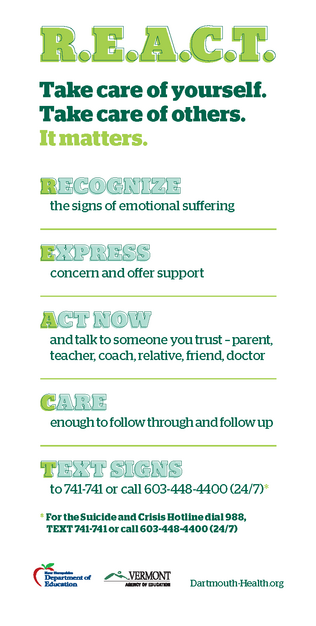Our R.E.A.C.T. Mental Health Awareness Campaign provides students throughout New Hampshire and Vermont with tips to deal with signs of emotional suffering and resources for support and help.
The R.E.A.C.T campaign was developed to provide clear next steps to take when someone sees some, or all, of the five signs of emotional suffering in another person.
R.E.A.C.T stands for:
- Recognize the signs of emotional suffering
- Express concern and offer support
- Act Now and talk to someone you trust—parent, teacher, coach, relative, friend, doctor
- Care enough to follow through and follow up
- Text 'Signs' to 741-741 or call 603-448-4400 (24/7)
R.E.A.C.T supplements the Five Signs campaign developed by Barbara Van Dahlen of Change Direction. The idea for the Five Signs was modeled on the theory that, like knowing the Five Signs of a heart attack or stroke, we should all know the Five Signs of emotional distress; and when we see those signs we should take action.
Led by Senior Director of Public Affairs John Broderick, formerly the Chief Justice of the New Hampshire Supreme Court, and in collaboration with the Dartmouth Health Children's, the New Hampshire Department of Education, the Vermont Agency of Education, and other agencies and civic leaders across both states, Broderick has been reaching out to high school students, educators, parents and professionals to change the conversation on mental health and to help reduce stigma.
Broderick believes that students "have the ability to change the culture and the way mental health is viewed." He wants to spread this message to as many students, educators, parents and professionals as he can.
Watch this video from one of Broderick's talks to students at Mascoma Valley Regional High school in Canaan, New Hampshire.
If you are interested in learning more about R.E.A.C.T. or to schedule a presentation at your school, please contact: Karen Borgstrom at karen.j.borgstrom@hitchcock.org
